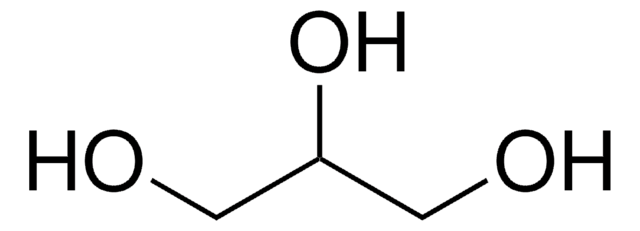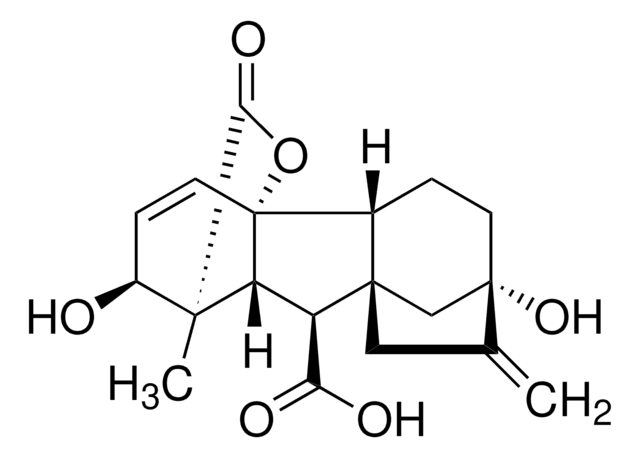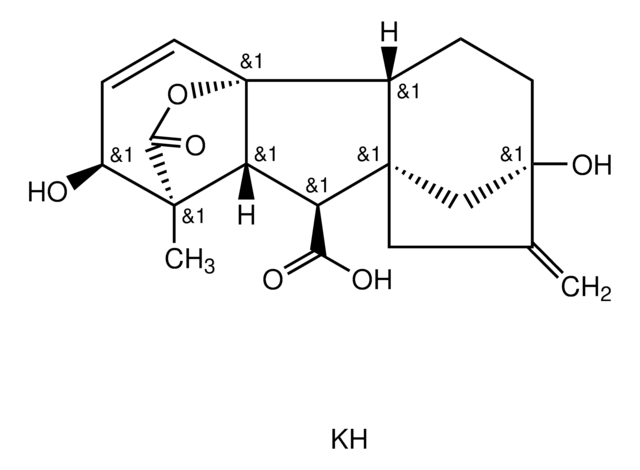G5516
Glycerol
for molecular biology, ≥99.0%
Synonym(s):
1,2,3-Propanetriol, Glycerin
About This Item
Recommended Products
grade
for molecular biology
reagent
Quality Level
vapor density
3.1 (vs air)
vapor pressure
<1 mmHg ( 20 °C)
assay
≥99.0%
form
viscous liquid
autoignition temp.
698 °F
expl. lim.
≥2.7-19.0 %
technique(s)
MALDI-MS: suitable
cryopreservation: suitable
impurities
<5 ppm Iron
<5 ppm heavy metal
<5 ppm magnesium
refractive index
n20/D 1.474 (lit.)
pH
5.5-8
bp
182 °C/20 mmHg (lit.)
mp
20 °C (lit.)
solubility
water: 1 mL/mL, clear, colorless
density
1.25 g/mL (lit.)
cation traces
Fe: ≤5 ppm
Mg: ≤5 ppm
heavy metals (as Pb): <5 ppm
application(s)
life science and biopharma
microbiology
sample preservation
foreign activity
DNase, RNase, NICKase, and protease, none detected
SMILES string
OCC(O)CO
InChI
1S/C3H8O3/c4-1-3(6)2-5/h3-6H,1-2H2
InChI key
PEDCQBHIVMGVHV-UHFFFAOYSA-N
Looking for similar products? Visit Product Comparison Guide
General description
Application
- a component of mounting medium for immunofluorescence
- a supplement during cell culture of Mycobacterium tuberculosis and Mycobacterium avium.
- a fuel during the designing of enzymatic biofuel cells.
- a liquid composite matrix with 4-HCCA and 3-aminoquinoline for analysis of neutral and acidic glycans.
- a matrix for fast atom bombardment MS.
Biochem/physiol Actions
Features and Benefits
Other Notes
greener alternative product
wgk_germany
WGK 1
flash_point_f
390.2 °F
flash_point_c
199 °C
ppe
Eyeshields, Gloves
Certificates of Analysis (COA)
Search for Certificates of Analysis (COA) by entering the products Lot/Batch Number. Lot and Batch Numbers can be found on a product’s label following the words ‘Lot’ or ‘Batch’.
Already Own This Product?
Find documentation for the products that you have recently purchased in the Document Library.
Customers Also Viewed
Articles
Technical Article on yeast media. Yeasts are eukaryotic microorganisms whose genomes have been comprehensively studied and some have been sequenced.
Protocols
Yeasts are considered model systems for eukaryotic studies as they exhibit fast growth and have dispersed cells. Yeast cultures can be grown, maintained, and stored in liquid media or on agar plates using techniques similar to those for bacterial cultures.
Our team of scientists has experience in all areas of research including Life Science, Material Science, Chemical Synthesis, Chromatography, Analytical and many others.
Contact Technical Service


